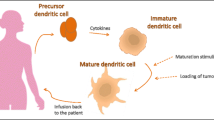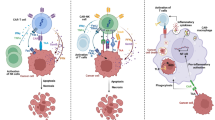Abstract
We recently reported that immunization with a recombinant MUC-1 vaccinia virus (rVMUC-1) protected C57BL/6 mice from challenge with DF3/MUC-1-positive syngeneic tumors. To elucidate whether anti-MUC-1 tumor immunity, especially MUC-1-specific cytotoxic T lymphocytes (CTI), can be induced in cancer patients by rVMUC-1, we stimulated the peripheral blood lymphocytes from patients with DF3/MUC-1+ or DF3/MUC-1 colon carcinomas using the autologous monocytes infected with rVMUC-1 (rVAMN). The stimulated T lymphocytes from two patients with DF3/MUC-1-positive colorectal carcinomas (rVPY+T and rVPW+T) demonstrated HLA-unrestricted cytotoxicity against MUC-1, whereas those from the patient with DF3/MUC-1-negative colon carcinoma (rVPA-T) did not. The HLA-unrestricted cytotoxicity was demonstrated by the CD8+ T cells possibly recognizing an epitope present on the tandem repeats. Adoptive immunotherapy who performed three times with patient PY, at 4-week intervals. The adoptive transfer of the first stimulated lymphocytes, demonstrating a high level of HLA-unrestricted cytotoxicity against MUC-1, resulted in the significant reduction of the liver metastasis of patient PY. However, HLA-unrestricted cytotoxicity against MUC-1 was extremely reduced at the second transfer and finally eliminated at the third, whereas the CD4+ T cells demonstrating HLA-class-II-restricted cytotoxicity against MUC-1 predominantly proliferated at the third adoptive immunotherapy treatment. The liver metastasis and the serum levels of tumor markers (carcinoembryonic antigen CA19-9) demonstrated a rapid and marked increment after the second transfer and especially after the third. These results suggest that the HLA-unrestricted cytotoxic CD8+ T cells against MUC-1, induced in patients with DF3/MUC-1+ colorectal carcinomas using rVMUC-1, correlate with the antitumor activity in vivo.
Similar content being viewed by others
Author information
Authors and Affiliations
Additional information
Received: 22 October 1997 / Accepted: 24 April 1998
Rights and permissions
About this article
Cite this article
Akagi, J., Nakagawa, K., Egami, H. et al. Induction of HLA-unrestricted and HLA-class-II-restricted cytotoxic T lymphocytes against MUC-1 from patients with colorectal carcinomas using recombinant MUC-1 vaccinia virus. Cancer Immunol Immunother 47, 21–31 (1998). https://doi.org/10.1007/s002620050500
Issue Date:
DOI: https://doi.org/10.1007/s002620050500




